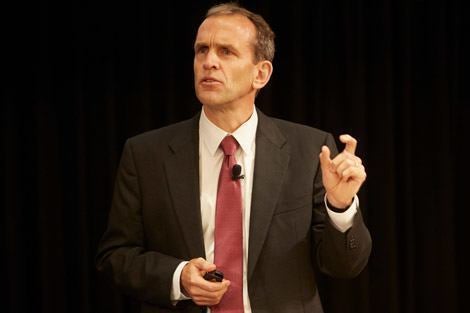October 27, 2014 — When Kent Walker’s mother-in-law was diagnosed with a type of brain cancer initially deemed incurable, Walker’s 17-year-old daughter began scouring the Internet for information that might help her grandmother’s cause. She came across an ongoing clinical trial on her grandmother’s specific type of cancer. Walker’s mother-in-law enrolled. After surgery and a 10-week course of chemotherapy—with minimal side effects—she was cured.
Walker, AB ’83, senior vice president and general counsel for Google, Inc., told a Harvard School of Public Health audience recently that he thinks big data played an outsized role in this remarkable story.
“It was a genetic cure,” Walker explained. The course of chemo his mother-in-law underwent is effective only on about 20% of the population that carries a particular set of genetic markers. Walker’s mother-in-law benefited because, today, researchers have access to so much data on cancer genetic abnormalities.
Walker’s daughter’s ability to find the clinical trial on the Internet is another example of big data at work. “Tools like the Internet connect all of us and create a big data revolution for patients as well as for doctors,” Walker said.
Walker’s talk on October 16, 2014 was the keynote at Harvard School of Public Health’s annual Leadership Summit, a two-day series of events showcasing the latest work of faculty and students for the Leadership Council, a group of key ambassadors and advocates for the School. Other sessions during the event focused on big data’s role in research on smartphones and mental health; on its ability to help uncover connections between health and environmental exposures; and on its usefulness during humanitarian crises.
Explosion in stored data
Walker presented striking statistics about the exponential growth of big data in recent years. As the cost of computer memory has fallen, the amount of stored data has soared. “By the year 2000, mankind had stored roughly 12 exobytes of data,” Walker said. “An exobyte is a lot.” But today “we create two exobytes of data every day,” he said, adding, “Ninety percent of the data in the world has been created in the last two years alone.”
Significantly, the cost of sequencing a person’s genome has dropped from $100 million 13 years ago to roughly $1,000 today.
Walker highlighted a number of other areas where big data is having a big impact on health. Wearable technology now allows people to track and monitor their fitness, their sleep, their stress, and more. Work is underway to gather massive amounts of data about Alzheimer’s—behavioral, genetic, environmental, epigenetic, clinical—in the search for ways to prevent and treat the disease. Satellite and cell phone data is being used to track population movements and to shed light on humanitarian disasters or the spread of disease.
Ethical, privacy issues
For all of its potential benefits, broad access to huge amounts of data also raises some troubling issues. “There are questions of privacy and consent,” Walker noted. “How do we balance the very sensitive nature of health care data and the extraordinary collective benefits of being able to use that data for your good and for the common good?”
Another concern is that individuals might use data for what some might consider poor choices, such as selecting the sex of a baby. There are also questions about who owns particular gene strains. Are they always the property of the individuals from whom they came? Or, if scientists alter the strains in the hunt for disease cures, do the new strains belong to those researchers?
“The big data data world has some fascinating challenges,” Walker said. “But done right, big data offers incredible new ways to understand ourselves at the deepest level.”
— Karen Feldscher
photo: Emily Cuccarese
